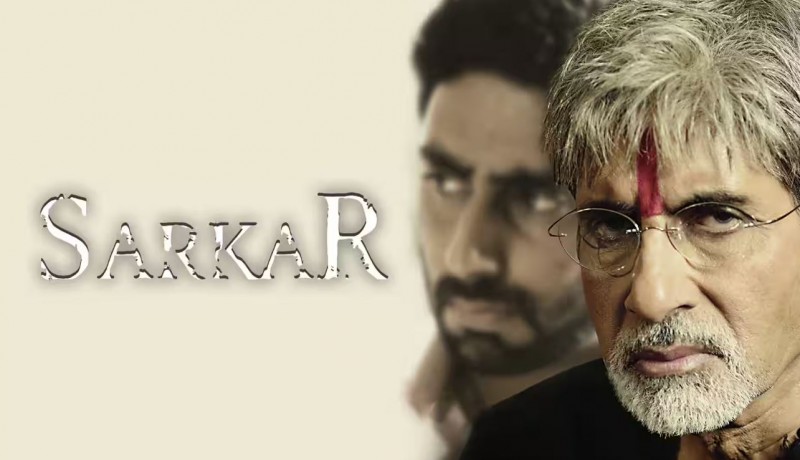
Bollywood frequently refers to "Sarkar," a 2005 political thriller film directed by Ram Gopal Varma, as one of its most recognisable works. Despite being a work of fiction, the movie heavily references real-life political figures and events. The claim that "Sarkar" is based on the life and legacy of influential Shiv Sena party leader Balasaheb Thackeray is one of the most well-known rumours surrounding the film. The various elements of "Sarkar" that allude to its relationship to Balasaheb Thackeray will be examined in this article, along with the similarities and differences between the characters in the movie and actual political figures. We'll also look at the sociopolitical environment in which the movie was produced.
The movie "Sarkar" tells the tale of Subhash Nagre, a strong and mysterious political figure who inspires unwavering loyalty in his supporters and commands enormous power within the state's political system. Amitabh Bachchan's character Subhash Nagre is frequently referred to as "Sarkar," a title that connotes both respect and dread. He is portrayed as a man with a strong moral code who administers justice when the system fails, frequently using unusual tactics.
Although Subhash Nagre is a made-up character, Balasaheb Thackeray's character and Subhash Nagre's bear a striking resemblance. Thackeray was a charismatic and commanding figure who founded the Shiv Sena party in 1966 and had a long and influential career in Maharashtra politics. The "Shiv Sainiks," Thackeray's devoted followers, were fiercely loyal to him, just like Subhash Nagre, and he was renowned for making bold and occasionally controversial statements.
Abhishek Bachchan, who is Subhash Nagre's younger son, plays a character named Shankar in "Sarkar" and is introduced to us as the character. According to how he is portrayed, Shankar would rather lead a quiet life free of political upheaval than inherit his father's political empire. This character is similar to Balasaheb Thackeray's son, Uddhav Thackeray, who eventually succeeded to his father's leadership of the Shiv Sena.
It's critical to take into account the sociopolitical environment in which "Sarkar" was produced in order to comprehend the potential connection between the author and Balasaheb Thackeray. Significant political developments in Maharashtra during the early 2000s included the ascendance to power of the Shiv Sena-Bharatiya Janata Party (BJP) alliance. During this time, Balasaheb Thackeray's political influence in the state was at its height, solidifying him as a major player in Maharashtra's political scene.
The "Sarkar" director, Ram Gopal Varma, has never formally stated that Balasaheb Thackeray is the inspiration for the story. He has acknowledged that real-life politicians had an impact on the characters and plot, though. It is widely accepted that the political dynamics and power struggles in Maharashtra at the time served as the film's inspiration.
Multiple themes in "Sarkar" are consistent with the political views of Balasaheb Thackeray and the Shiv Sena. In the movie, Subhash Nagre is portrayed as a leader who defends the underdogs and intervenes on their behalf when the legal system falls short of upholding the law. This fits with Thackeray's reputation as a leader who frequently voiced their opposition to perceived injustices and promoted the interests of the Marathi-speaking community.
The movie also explores the idea of loyalty and the unwavering support that Subhash Nagre enjoys from his supporters. This is a reflection of the steadfast loyalty Shiv Sainiks had for Balasaheb Thackeray, who they regarded as a father figure and obeyed his orders with the utmost devotion.
Both critics and viewers have debated the relationship between "Sarkar" and Balasaheb Thackeray. While some contend that the movie accurately portrays Thackeray's life and the Shiv Sena's influence in Maharashtra, others see it more as a fictional story that draws inspiration from a number of political figures than as a direct portrait of any one person.
The political climate of Maharashtra and Balasaheb Thackeray's larger-than-life persona undoubtedly served as inspiration for "Sarkar," despite the fact that it is a work of fiction. Characters, themes, and the socio-political setting of the movie all suggest that Thackeray's legacy may have had some influence. It's crucial to keep in mind that "Sarkar" is still a cinematic interpretation and is not meant to be taken as a precise historical account of Thackeray's or the Shiv Sena's journey.
Even though "Sarkar" is a fictional work, it undoubtedly drew inspiration from the political climate of Maharashtra and Balasaheb Thackeray's flamboyant persona. Thackeray's legacy may have had some impact on the movie based on the characters, themes, and socio-political setting. It's important to remember that "Sarkar" is still a cinematic interpretation and is not meant to be taken as a precise historical account of Thackeray's or the Shiv Sena's journey.
Kareena Kapoor's Parallel Journey in 'Ajnabee' and 'Talaash'
Bhoomika Chawla's Nine-Year Break Ends with a Bang in 'MS Dhoni: The Untold Story'